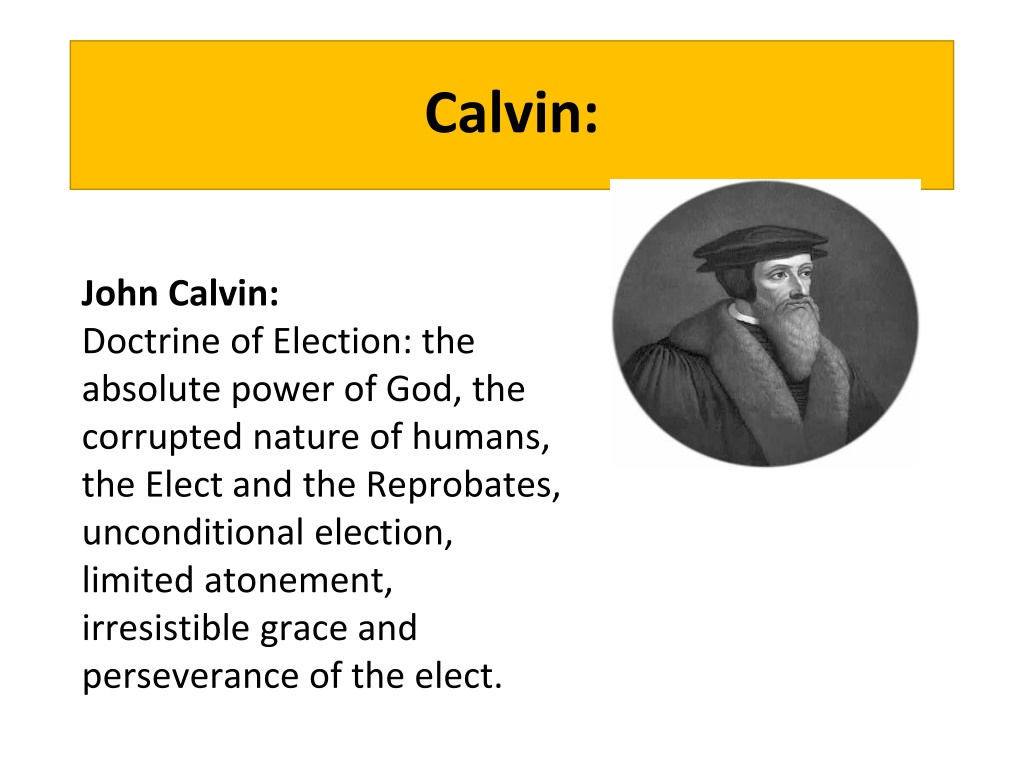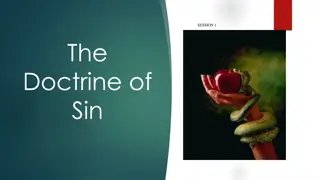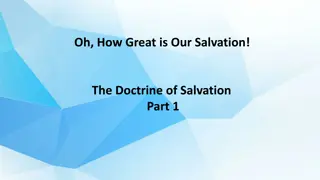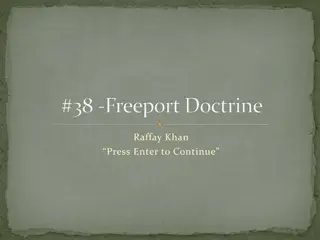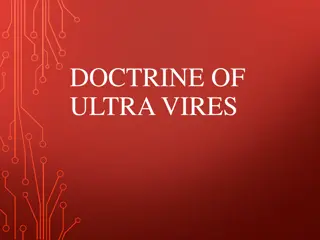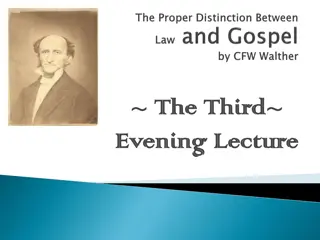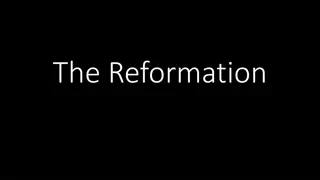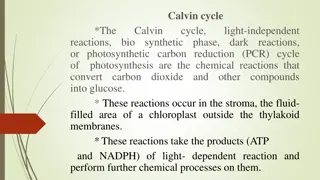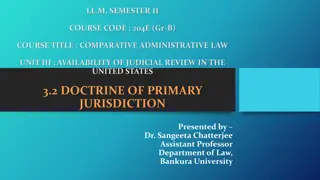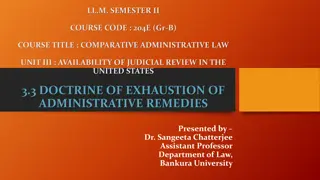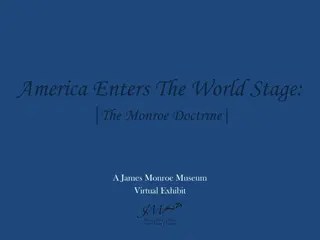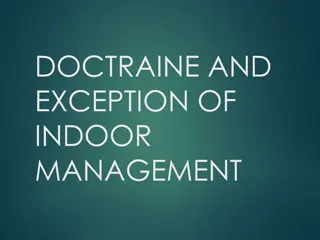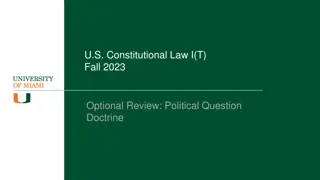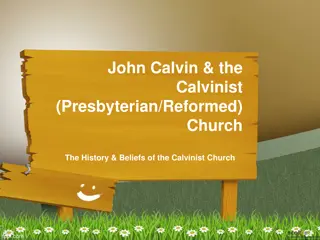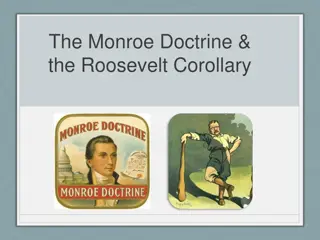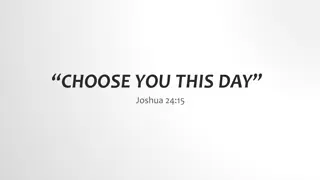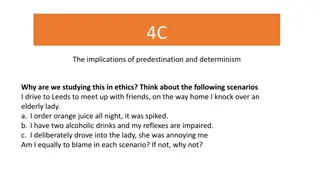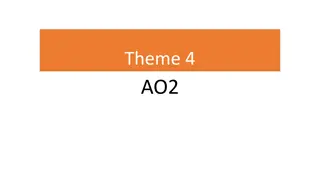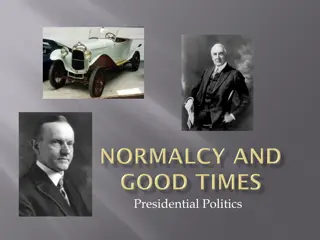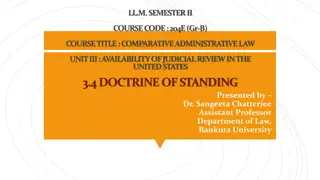John Calvin's Doctrine of Predestination: A Summary
John Calvin's doctrine of predestination revolves around the absolute power of God, the corrupted nature of humans due to original sin, and the concepts of the Elect and the Reprobates. Calvin believed in unconditional election, limited atonement, irresistible grace, and the perseverance of the elect. Those predestined for salvation (the Elect) cannot fail to be saved, while the Reprobates are predestined for damnation. Calvin emphasized God's sovereignty in choosing His elect and maintained that humans can do nothing to merit salvation on their own. Faith, not works, is the basis for judgment. At the core of Calvin's beliefs is the notion that God's omnipotence would be compromised if salvation were based on human works. The doctrine of predestination is a divine mystery that encompasses total depravity, unconditional election, limited atonement, irresistible grace, and the perseverance of the saints.
Download Presentation

Please find below an Image/Link to download the presentation.
The content on the website is provided AS IS for your information and personal use only. It may not be sold, licensed, or shared on other websites without obtaining consent from the author. Download presentation by click this link. If you encounter any issues during the download, it is possible that the publisher has removed the file from their server.
E N D
Presentation Transcript
Calvin: John Calvin: Doctrine of Election: the absolute power of God, the corrupted nature of humans, the Elect and the Reprobates, unconditional election, limited atonement, irresistible grace and perseverance of the elect.
Key Terms: Those who have been predestined to be saved. Elect Those who have been predestined to be damned. Reprobate Refers to the forgiving or pardoning of sin. This is achieved through the suffering, death and resurrection of Jesus, enabling the reconciliation between God and his creation. Atonement
What does Calvin believe about predestination? 1. God is omnipotent. 2. He did not accept free will as all humans have been predestined. 3. Humans are depraved as a result of original sin and can achieve nothing through our own merits. 4. God s election of some people and humans nature as damned 5. God has exercised his sovereignty and chosen his elect for salvation.
What does Calvin believe about predestination? 6. They are chosen before birth, why they are chosen is a mystery. 7. The elect cannot fail to be saved irresistible Grace 8. God causes the elect to seek forgiveness if they sin. 9. The elect are those who have remained with Jesus Christ as the rest of humanity (The Reprobates) fall away and are damned.
What does Calvin believe about predestination? ? 10.In order to maintain God s just nature, we must be judged on our faith. It is not a requirement of God to make salvation available. 11.If God saved people based on their works it it would imply that we are co-authors of life, putting us on par with God. This takes away from his omnipotence.
What does Calvin believe about predestination? 12.At death. It is a divine mystery. 13. T total depravity. U unconditional election. L limited atonement. I irresistible grace. P perseverance of the saints.
What does Calvin believe about predestination? TASK: watch the video and add details to you 13 point summary. https://www.youtube.co m/watch?v=ITszAmP3fF A&index=17&list=PL2gg VdhXSioxebariYjPJGPi5IX g0B6oI
What does Calvin believe about predestination? TASK: read the information on Calvinism on pages 11 and 12, 16 and 17. Complete the tasks on pages 13, 14 and 15. EXTENSION: take one of the quotes and create a drawing in your notes to help you remember the quote. 20 minutes
Calvins Predestinatio Calvin s Predestination n Limited, The Fall, Reprobates, will, atonement, corrupted Fill in the gaps on the paragraph on page 15
Calvins Predestination Candidates need to understand John Calvin s Doctrine of .... They need to appreciate that Calvin believed that due The Fall to .. . the nature of humanity has been corrupted irreversibly ... Therefore, because God has absolute power He divides all humanity into two predestined groups: Reprobates the Elect and the .. . Calvin also argued that God will chooses the elect purely through His own .. (unconditional atonement election), that Christ's death and for our sins limited was for the elect only ( . atonement), the elect cannot resist the calling of God (irresistible grace) and the elect cannot commit apostasy (perseverance of the Elect).
What are the similarities and differences between Calvin and Augustine? TASK: Read the summary sheet and fill in the missing words Create a Venn Diagram/ or table to compare and contrast the Calvinist and Augustinian theories on predestination. Religious believers should accept Calvinist views on predestination rather than Augustine s. .
Explain Augustines and John Calvins understanding of predestination. (20) TASK: in pairs, create a list of points that could be included in this question. CHALLENGE: begin to put together evidence and explanations to support your notes. 5 minutes
Explain Augustines and John Calvins understanding of predestination. (20) Self assess your essay plans Check each paragraph does it contain? P OINT E XAMPLE/QUOTE E XPLAIN L INK TO THE QUESTION 3 minutes
Explain Augustines and John Calvins understanding of predestination. (20) Swap your essay plan with another students plan. How can they be improved? 3 minutes P OINT E XAMPLE/QUOTE E XPLAIN L INK TO THE QUESTION
What does Calvin believe about predestination? DIL 1. Read John Calvin's Doctrine of Election by Rev. Bryn MacPhail (on my website https://ncpreligiousstudies.wordpress. com/) 2. Make notes using the specification as guidance. 3. Read the sample answer. 4. Write an essay plan for the AO1 question - Explain Augustine s and John Calvin s understanding of predestination. (20) CHALLENGE: listen to the BBC Radio In Our Time programme on Calvinism. Make notes.
Lets hear your responses Let s hear your responses
AO2 Issues A consideration of whether religious believers should accept predestination. The extent to which God predestines humanity.
A consideration of whether religious believers should accept predestination. 1. Why would religious believers accept predestination? If it was credible Religious texts support it Theological support e.g. Augustine and Calvin Historical acceptance e.g. Councils of Carthage and Dort (accepted TULIP) Monotheistic ideas about God 2. Why would religious believers reject predestination? If it was credible If religious texts opposed it Theological support for Free Will (we will study this later) e.g. Pelagius and Arminius Historical acceptance e.g. Methodist Church Monotheistic ideas about God
The extent to which God predestines humanity. To a large extent To a lesser extent Religious texts Job 14:5 omniscient God, Free Will John 8:36 If the Son sets you free, you will be free indeed . Theological arguments and historical support. Augustine humanity born with Free Will (soft determinism) Religious texts (as previously) Theological arguments and historical support Conclusion
Evaluating predestination For pre destinination Point Against predestination Credible Bible Theologians Historical acceptance Concepts of God
